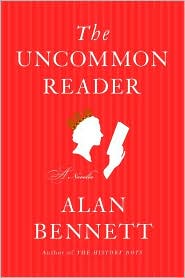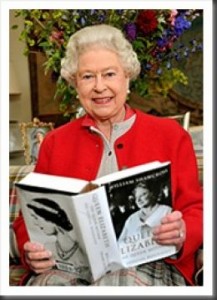“As a girl, one of [the Queen’s] greatest thrills had been on VE night when she and her sister had slipped out of the gates and mingled unrecognized with the crowds. There was something of that, she felt, to reading. It was anonymous; it was shared; it was common. And she who had led a life apart now found that she craved it. There in these pages and between these covers she could go unrecognized.”
Cha sing after her rowdy dog-pack one day, the Queen discovers them barking at a “removal-like van,” a bookmobile, parked outside the kitchen at Windsor. Entering the mobile library to apologize for the din, the Queen meets Norman Seakins, a young man from the kitchen whose primary interest is in gay books and photography. Feeling obligated to take a book, the Queen borrows a novel by Ivy Compton-Burnett, intending to return it the following week when the bookmobile returns.
sing after her rowdy dog-pack one day, the Queen discovers them barking at a “removal-like van,” a bookmobile, parked outside the kitchen at Windsor. Entering the mobile library to apologize for the din, the Queen meets Norman Seakins, a young man from the kitchen whose primary interest is in gay books and photography. Feeling obligated to take a book, the Queen borrows a novel by Ivy Compton-Burnett, intending to return it the following week when the bookmobile returns.
Almost immediately, her life changes. That night, when the president of France arrives, she abandons her usual safe conversation and, addressing the president, remarks, “I’ve been longing to ask you about the writer Jean Genet…Homosexual and jailbird, was he nevertheless, as bad as he was painted?” The French president, unbriefed on this topic, knows it’s going to be a long evening.

As the Queen’s reading tastes expand, often under the direction of Norman, whom she promotes to being her “amanuensis,” she becomes less interested in the day-to-day activities of state. She arrives late to the opening of Parliament because Norman had to fetch the book she wanted to read in the coach during the procession. She no longer keeps to the tried and true conversational subjects (the traffic on the road to the palace), raising new topics, unexpectedly, as she mixes with the public and meets honored guests. People become confused and alarmed by her spontaneous questions, and members of the general public become tongue-tied when the Queen asks them what they are reading. Dinner conversations no longer have the pleasant, easy-going atmosphere that once made invitations to the palace such memorable occasions.
Her family is deligh ted by her reading—she leaves them alone and gives them more freedom than ever before—but the press notes that she is less careful of her dress, sometimes wearing the same outfit to two events in the same month. Her equerries worry that she has Alzheimer’s because she’s constantly writing things down. Eventually, the Prime Minister becomes alarmed, after being ignored during an interminable weekend at Balmoral because the Queen was reading. He determines to stop this activity.
ted by her reading—she leaves them alone and gives them more freedom than ever before—but the press notes that she is less careful of her dress, sometimes wearing the same outfit to two events in the same month. Her equerries worry that she has Alzheimer’s because she’s constantly writing things down. Eventually, the Prime Minister becomes alarmed, after being ignored during an interminable weekend at Balmoral because the Queen was reading. He determines to stop this activity.
In this wickedly wry novella, Alan Bennett explores reading, writing, and their effects on our lives as he develops this imaginative and warmly humorous scenario. Though the eponymous “uncommon reader” is the Queen, her reactions to her reading (and other people’s responses to her as a result of her reading) are so true-to-life and so plausible that Bennett accomplishes a feat rarely even attempted—he makes the reader identify with the Queen of England in her increasingly voracious reading habits. Soon she is keeping a journal of her reading, and Bennett’s fans and readers of this novella will be rooting for her triumph as a bibliophile.

Bennett’s humor has always depended on the fine line he creates between reality and absurdity, and his explorations into the absurd are so close to reality, or what we might wish reality to be, that the reader sees, ironically, the absurdity of reality itself. The Queen’s real life, which some consider absurd on its face, plays into Bennett’s hands here, as he posits an alternative “reading lifestyle,” one to which many of his readers are firmly committed. He is respectful of the Queen here, making her seem human (though perhaps that, in and of itself, will be thought disrespectful by traditionalists) and connected with her public in new ways. Bennett keeps the humor low-key, evoking images which allow the reader to discover, unassisted, the ironies which are so hilarious throughout the novella.
As the Queen takes full charge of her life, the reader begins to wonder how Bennett will ever end this wonderful romp of a book. Then he surprises us with a perfect, climactic ending, which takes place on her eightieth birthday. Dramatist that he is, Bennett knows exactly when to stop. And does. (On my Favorites List for 2007)
Notes: The photo of the author accompanies a wonderful character study of him at http://www.guardian.co.uk
The Queen and her staff surrounded by her some of her seven corgis. http://www.dailymail.co.uk
The Queen reading: http://hubpages.com
